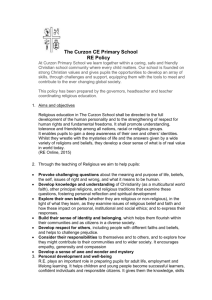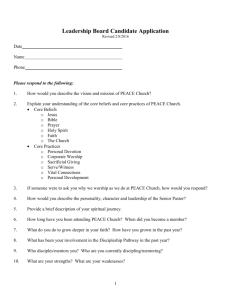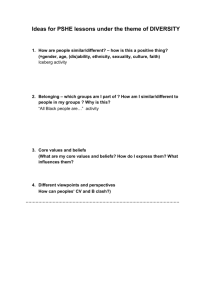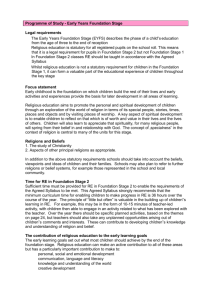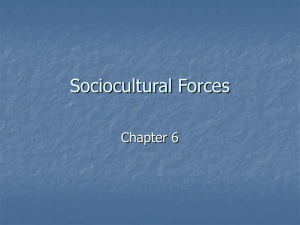RELIGIOUS EDUCATION - Diocesan Department for Education
advertisement
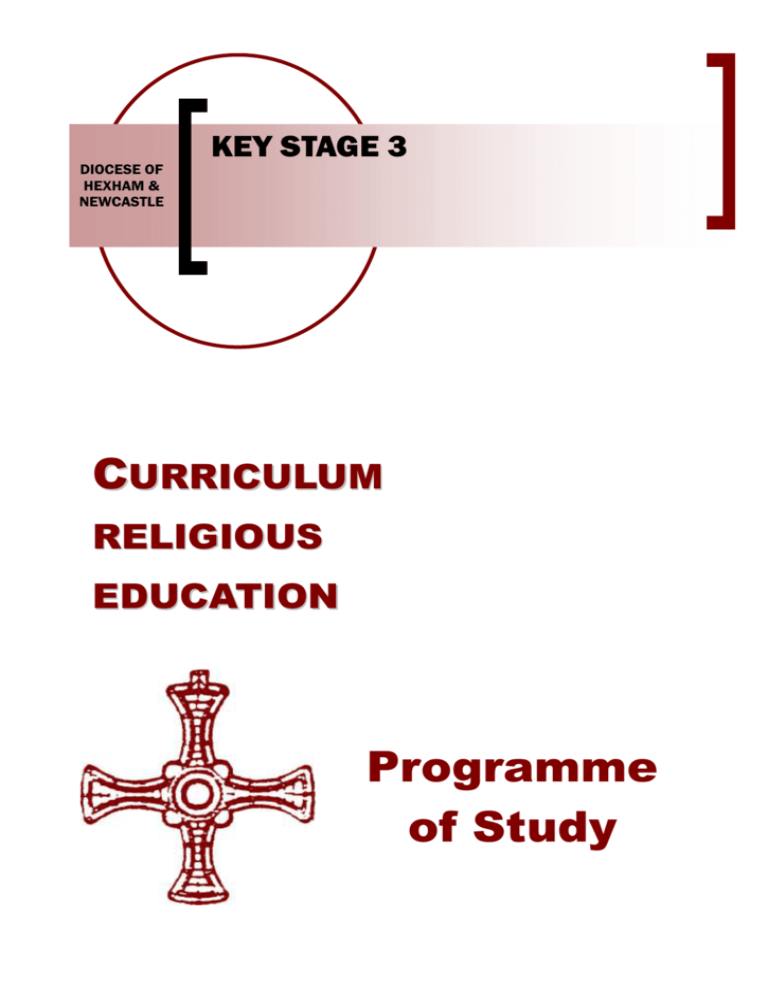
DIOCESE OF HEXHAM & NEWCASTLE KEY STAGE 3 CURRICULUM RELIGIOUS EDUCATION Programme of Study KEY STAGE 3 PROGRAMME OF STUDY INTRODUCTION In this programme of study you will find curriculum guidance for Religious Education for young people at Key Stage 3 in Catholic schools and colleges. It is the outcome of continuing work and reflection on the nature and purpose of Religious Education in changing circumstances. Not least of these changes is the re-organisation of the general curriculum for the 3-14 age group. In addition a new non-statutory National Framework for Religious Education has been developed by the Qualifications and Curriculum Authority (QCA) and the Department for Children, Schools and Families (DCSF), which has much to commend it and we acknowledge the fact that the Catholic community has benefited from it. It will guide schools and colleges in the diocese as they make decisions about schemes to be used. It will provide a benchmark to safeguard standards, and help to ensure continuity and coherence in any schemes to be approved for use in Catholic schools and colleges within the diocese. The programme of study sets out an entitlement for all young people at Key Stage 3 in their study of Religious Education. It sets out the aims, values and attitudes to be pursued in Religious Education and also identifies the knowledge, understanding and skills to be taught across the age range. It includes suggestions about the breadth and depth of study which should be attempted. It will help schools and colleges to select and plan an appropriate curriculum in Religious Education for the full range of young people in their care. These decisions will be enlightened by the standards established in this programmme of study which are themselves informed by the principles of continuity and coherence. In pursuing this path, schools and colleges will be confident that their pupils will be following an appropriate curriculum in Religious Education that will both affirm and challenge them and teach them how to interpret their world religiously. The curriculum described in this programme will contribute to the provision of an ongoing systematic and comprehensive exploration of the Christian mystery, the revelation of God in Jesus Christ. In Christ, God reveals the truth about Himself and humanity, and the response to this revelation in faith is itself a challenging and exciting lifelong journey. This programme of study will also serve as a benchmark for the development of schemes of work and resources. Page 2 of 10 RELIGIOUS EDUCATION AND CURRICULUM AIMS “The Catholic vision of education promotes the dignity and freedom of every person as created in the image and likeness of God”. i It addresses not only the main areas of Every Child Matters but nurtures human wholeness. Classroom religious education makes explicit this vision which underpins the entire ‘Catholic curriculum’ as a whole epitomising an “educational philosophy in which faith, culture and life are brought into harmony”.ii It is the ‘core’ of the curriculum and the source from which flows authentic perspectives on life. As a consequence: the promotion of the human person is the goal of the Catholic schooliii and therefore: the religious dimension of the whole educational enterprise will be characterised by attentiveness, intelligence, reasonableness and responsibility and will promote the accomplishment of a life ‘lived to the full’ in contemporary society.iv Learning and undertaking activities in Religious Education will naturally and inevitably contribute to achievement of the aims of the wider curriculum for all young people to become: successful learners who enjoy learning, make progress and achieve; confident individuals who are able to live safe, healthy and fulfilling lives; responsible citizens who make a positive contribution to society. Page 3 of 10 THE IMPORTANCE OF RELIGIOUS EDUCATION The intended outcome of classroom religious education is: ‘religiously literate young people who have the knowledge, understanding and skills – appropriate to their age and capacity to think spiritually ,ethically and theologically, and who are aware of the demands of religious commitment in everyday life’v . This programme of study addresses the aims and objectives of classroom Religious Education summarised by the Bishops of England and Wales as, ‘the comprehensive and systematic study of the mystery of God, of the life and teachings of Jesus Christ, the teachings of his Church, the central beliefs that Catholics hold, the basis for them and the relationship between faith and life; in a manner which encourages investigation and reflection by the pupils’, develops the appropriate skills and attitudes, and promotes free, informed and full response to God’s call in everyday life’.vi Thus in classroom Religious Education young people will engage with a programme of study which will inspire and challenge them personally, intellectually and (for some) catechetically. VALUES AND ATTITUDES Catholic education necessarily incorporates a commitment to certain values and attitudes which spring from an encounter with the person and teaching of Jesus. In Catholic schools and colleges Religious Education will have a preeminent role in the promotion of wisdom, truth, justice, freedom, integrity, and respect and compassion for all peoples and the created world. Our Christian tradition recognises and affirms here the presence of the gifts of the Holy Spirit. Good Religious Education will develop and foster the following attitudes: an open-mindedness or spirit of enquiry; attentiveness, appreciation, awe and wonder; respect for and a sense of reverence for all peoples and the earth they inhabit; self-esteem, self awareness and self-sacrifice; understanding and discernment. The non-statutory National Framework emphasises the fact that attitudes are essential for good learning in Religious Education.vii Page 4 of 10 AUTHENTIC THEOLGICAL ENQUIRY In exploring the field of religious education we make use of five key or critical ways of unpacking any topic which provide ways of understanding and thinking about the content being explored. These ways or tools of research are Scripture, Tradition, Reason, Interpreted Experience and Faith. They provide windows or perspective or insight opportunities into the meaning of any particular topic, theme or teaching. Thus we ask: what do we learn from scripture and tradition, from the Bible and the teaching of the Church, about this topic? how does reason inform, elucidate or challenge our understanding? what do we learn from experience interpreted in the light of scripture, tradition, reason, faith and our cultural context? what can be learned, known, felt and understood on the basis of the faith of the believer? These avenues of theological enquiry are not independent of each other: scripture and tradition underpin faith, but faith acknowledged their authority; faith informs reason and reason adds meaning to faith; experience must be interpreted in the light of all these avenues if it is to be meaningful for the learner in religious education. Page 5 of 10 KEY CONCEPTS There are a number of key concepts that underpin the study of RE. Pupils need to understand these concepts in order to deepen and broaden their knowledge, skills and understanding. 1.1 Beliefs, teachings and sources. understanding religious sources, beliefs, ideas, feelings and experiences and make links between them identifying sources of religious belief and explaining how distinctive religious beliefs arise explaining how sources and arguments are used in different ways by different traditions to provide answers to questions of religious belief, ultimate questions and ethical issues. 1.2 Celebration and ritual. using religious terms to show an understanding of different liturgies explaining the meaning and purpose of a variety of forms of worship explaining the significance for believers of different forms of religious and spiritual celebration. 1.3 Social and moral practices and way of life. understanding how religious belief shapes life identifying similarities and differences between peoples’ responses to social and moral issues because of their beliefs explaining how religious beliefs and teaching influence moral values and behaviour. 1.4 Engagement with own and others’ beliefs and values. understanding how own and others’ decisions are informed by beliefs and values explaining what beliefs and values inspire and influence them and others expressing insights into the reasons for their own and others’ beliefs and values and the challenges of belonging to a religion. 1.5 Engagement with questions of meaning and purpose. engaging with and responding to questions of life in the light of religious teaching demonstrating how religious beliefs and teaching give some explanation of the purpose and meaning of human life explaining with reference to religious beliefs their own and others’ answers to questions of meaning. Page 6 of 10 KEY PROCESSES Learning about and learning from religion involves the skills of enquiry, investigation, analysis, interpretation and evaluation. It demands an increasing ability to think rigorously and present coherent, informed and detailed arguments using specialist vocabulary. It develops pupils' skills of application, interpretation, evaluation and expression of what they learn about religion. Pupils learn to develop and communicate their own ideas, values and attitudes, particularly in relation to questions of belief, meaning, purpose and truth, and values and commitments. They learn to relate their learning to the wider world. The pre-eminent skill to be developed is of thinking spiritually, ethically and theologically; to grow in religious understanding; to be able to see and interpret the world from a religious perspective. Individual skills which will build these overarching skills include: investigation, interpretation, reflection, empathy, evaluation, analysis, synthesis, application and expression. The skills of religious education are shared with other subjects, but take on a different character when applied to the content of the subject. 2.1 Learning about religion Pupils should be able to: 1. understand and interpret scripture, other texts and authorities, and forms of religious and spiritual expression 2. analyse religious beliefs, arguments and ideas. 3. explain religious beliefs, practices and commitments, including their transmission by people, texts and traditions 4. investigate the impact of religious beliefs and teachings on individuals, communities and societies, the reasons for commitment and the causes of diversity 5. apply a range of religious vocabulary appropriate to their age consistently and accurately, recognising both the power and limitations of language in expressing religious ideas and beliefs 6. evaluate how religious beliefs and teachings inform answers to ultimate questions and ethical issues 2. 2 Learning from religion Pupils should be able to: 1. reflect on the relationship between beliefs, teachings, experience and ultimate questions 2. evaluate beliefs, commitments and the impact of religion in the contemporary world 3. express insights into the significance and value of religion and other world views for human relationships personally, locally and globally 4. express their own beliefs and ideas, using a variety of forms of expression, including creative forms and reasoned arguments. Page 7 of 10 (See Appendix 1, p.20 in Bishops’ Conference Department for Catholic Education and Formation, Faith and Science, Church and State, Religious Diversity and Dialogue for more detail regarding these skills and processes). An additional aspect of Religious Education has been identified as ‘reflection and contemplation’ which is to be considered as aspirational rather than evaluative and judgemental. Page 8 of 10 RANGE AND CONTENT (Breadth of study) This section outlines the breadth of the subject on which teachers should draw when teaching the key concepts and key processes. The study of Religious Education should include: a. Catholic Christianity in all its richness; b. two other principal religions, one Abrahamic and one other; c. national and global Catholic cultural heritage; d. the main developments of the history of the Church in Britain; e. a secular worldview where appropriate; f. moral education including differences in the human and moral framework; g. the philosophy of religion, where appropriate. All of the above can be taught through the over-arching themes drawn from the well of Christianity such as: h. the relationship between faith and science; i. the common good; j. stewardship; k. spirituality; l. religious diversity and dialogue; m. beliefs and concepts; n. authority. Page 9 of 10 CURRICULUM OPPORTUNITIES During the Key Stage pupils should be offered the following opportunities that are integral to their learning and enhance their engagement with the concepts, processes and content of the subject. The curriculum should provide opportunities for pupils to: 1. encounter people from different religious, cultural and philosophical groups, who can express a range of convictions on religious and moral issues, where possible 2. visit places of major religious significance, where possible 3. use ICT to enhance understanding of religion 4. discuss, question and evaluate important issues in religion and philosophy, including ultimate questions and ethical issues 5. reflect upon and carefully evaluate their own and others’ beliefs and values, using reasoned, balanced arguments 6. use a range of forms of expression to communicate their ideas and responses 7. explore the connections between RE and other subject areas. Bishops’ Conference of England and Wales, Religious Education Curriculum Directory, 1996, p.10. ii Congregation for Catholic Education, The Religious Dimension of Education in a Catholic School, n.34. iii Congregation for Catholic Education, The Catholic School on the Threshold of the Third Millennium, n.9. iv Bishops’ Conference Department for Catholic Education and Formation, Faith and Science, Church and State, Religious Diversity and Dialogue, p.10. v Bishops’ Conference of England and Wales, Religious Education Curriculum Directory, 1996, p.10. vi Bishops’ Conference of England and Wales, Religious Education in Catholic Schools, 2000.p.6 vii Amplification of these attitudes can be found in ‘Religious education: The non-statutory national framework, QCA, 2004, pp.8,13; ‘Model syllabuses for religious education, SCAA, 1994, p.7; Broad Areas of Attainment in Religious Education, NBRIA, Rejoice Publications, 1994, p.20. i Page 10 of 10



